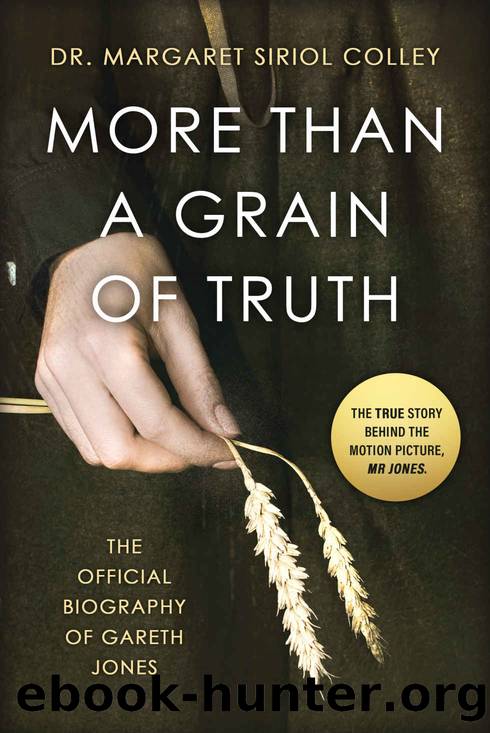More than a Grain of Truth: The official true story behind the film Mr. Jones, starring James Norton by Colley Margaret Siriol & Colley Nigel Linsan

Author:Colley, Margaret Siriol & Colley, Nigel Linsan [Colley, Margaret Siriol]
Language: eng
Format: epub
Publisher: Lume Books
Published: 2020-01-31T00:00:00+00:00
Child Beggars in Moscow â Library photo accompanying Evening Standard, March 31, 1933, article.
In Moscow, Gareth had been impressed by the warm clothes of most of those people who frequented the centre of the city and by the health of the children. After a reception at the Soviet Foreign Office he decided to explore the homes of the workers:
I had learned that the children were given good meals in school. I had talked to skilled workers who were well paid, and received plenty to eat in their factories, and I knew that some shops were moderately well stocked, although entrance was limited to privileged persons. The number of fine motor-cars rushing through the streets had struck me as a great improvement over 1930 and 1931⦠If it were not therefore for begging peasants, I would have drawn the conclusion that all was well with Moscow. But would my visits to Soviet workersâ homes confirm that impression.
I left the centre of the town and found myself alone in a dark side street. I entered a courtyard littered with rubbish. To the left stood a wooden house with an. open door, through which I went. It led me into a semi-lit corridor with doors on each side leading into rooms. A working woman came out. âWhat do you want?â âI want to see how workers live,â was my reply. Her husband invited me in. âWeâll show you how they make us workers live,â he said bitterly. There was one small room with a bed which occupied almost the whole of the space. âThree of us live here,â said the woman.
âCome and visit the next family.â The next room was still smaller. An ikon was hanging in the corner. On the bed an old woman was lying, pale and ill. âThree live here,â she said, âbut when my sons came back on leave from the Red Army we were five.â I wondered how five could possibly sleep in the small space of the room. In some of the rooms in the house there were six, seven, and even eight in each room.
As I talked to the old woman a girl of about twelve years of age, with a large red necktie, entered. Her face around her eyes was swollen with crying. Her mother followed her, and her pale face was also swollen with tears. âWhat is the matter?â I asked. The mother replied: âWe have been refused passports, and we have to leave Moscow by March 30. We know no one in the world except in Moscow, but we have to go beyond sixty-five miles from Moscow. Where can we go? How will we have food there?â
âBut surely they will leave you your bread card?â I asked. âNot even a bread card, and we have no money.â The old woman said also that she was refused a visa and would have to leave Moscow, but she was quiet, and seemed resigned, although she knew well what her fate would be. These people were the victims of passportisation.
Download
This site does not store any files on its server. We only index and link to content provided by other sites. Please contact the content providers to delete copyright contents if any and email us, we'll remove relevant links or contents immediately.
| General | Channel Islands |
| England | Northern Ireland |
| Scotland | Wales |
Room 212 by Kate Stewart(4137)
The Crown by Robert Lacey(4127)
Endurance: Shackleton's Incredible Voyage by Alfred Lansing(3877)
The Iron Duke by The Iron Duke(3665)
The Rape of Nanking by Iris Chang(3548)
Killing England by Bill O'Reilly(3478)
Joan of Arc by Mary Gordon(3282)
Say Nothing by Patrick Radden Keefe(3090)
I'll Give You the Sun by Jandy Nelson(2858)
Shadow of Night by Deborah Harkness(2768)
Hitler's Monsters by Eric Kurlander(2752)
Margaret Thatcher: The Autobiography by Thatcher Margaret(2698)
Mary, Queen of Scots, and the Murder of Lord Darnley by Alison Weir(2690)
Darkest Hour by Anthony McCarten(2666)
Blood and Sand by Alex Von Tunzelmann(2623)
Red Famine: Stalin's War on Ukraine by Anne Applebaum(2484)
Eleanor & Park by Rainbow Rowell(2418)
The One Memory of Flora Banks by Emily Barr(2367)
Book of Life by Deborah Harkness(2297)
